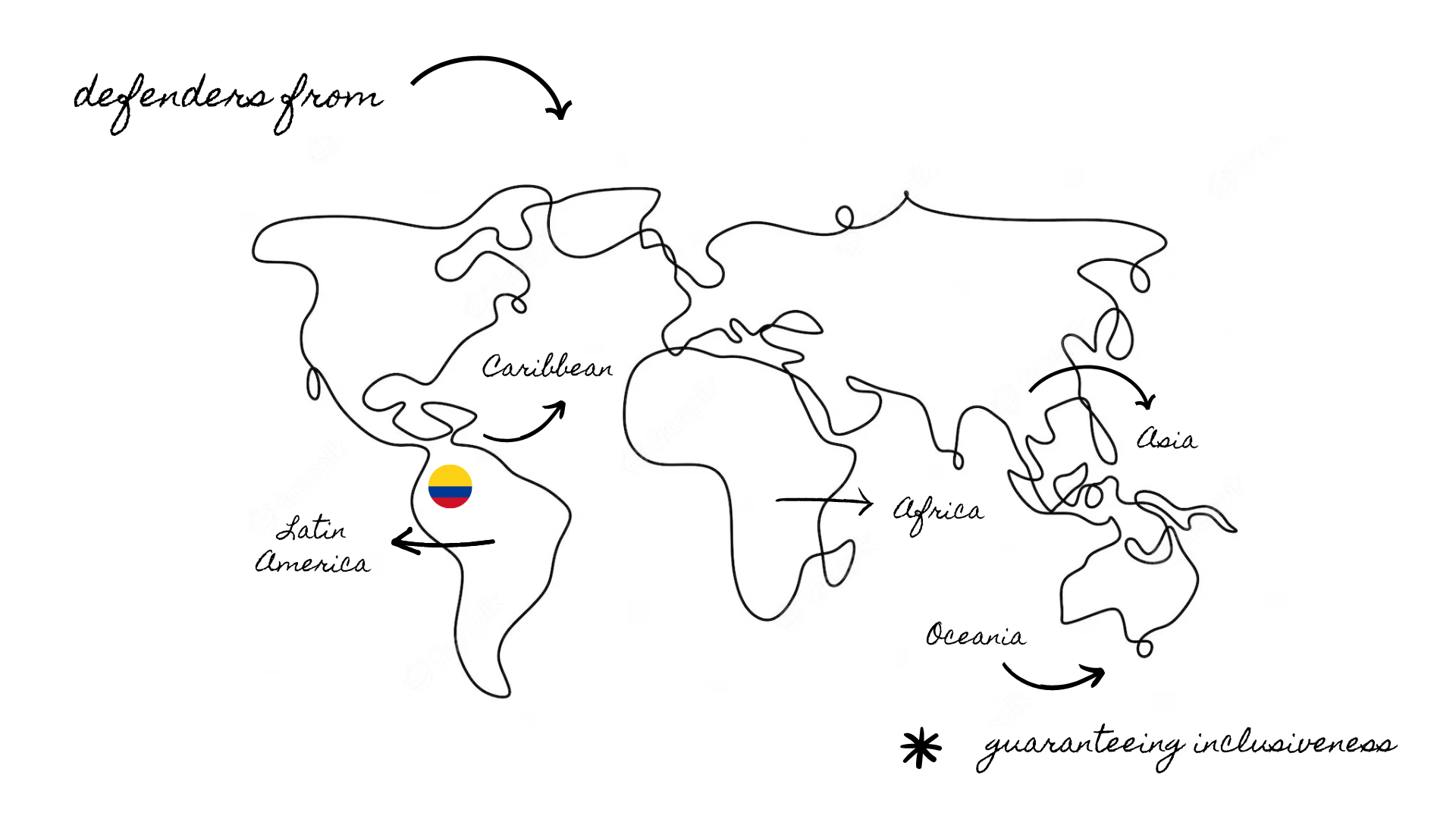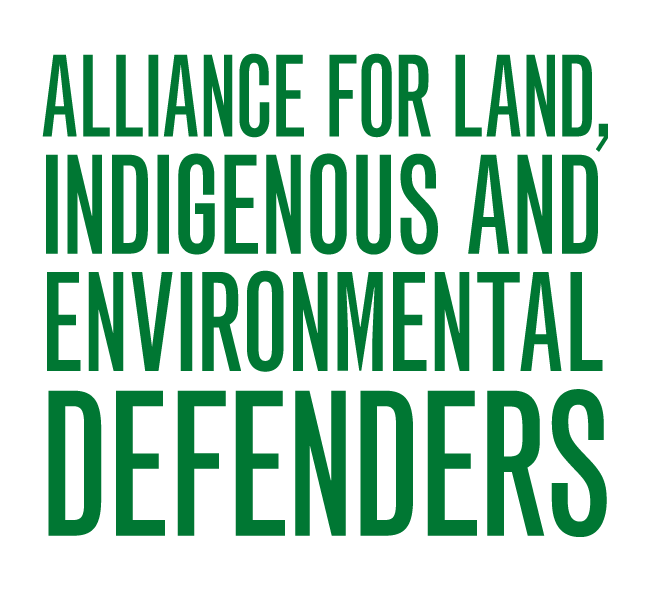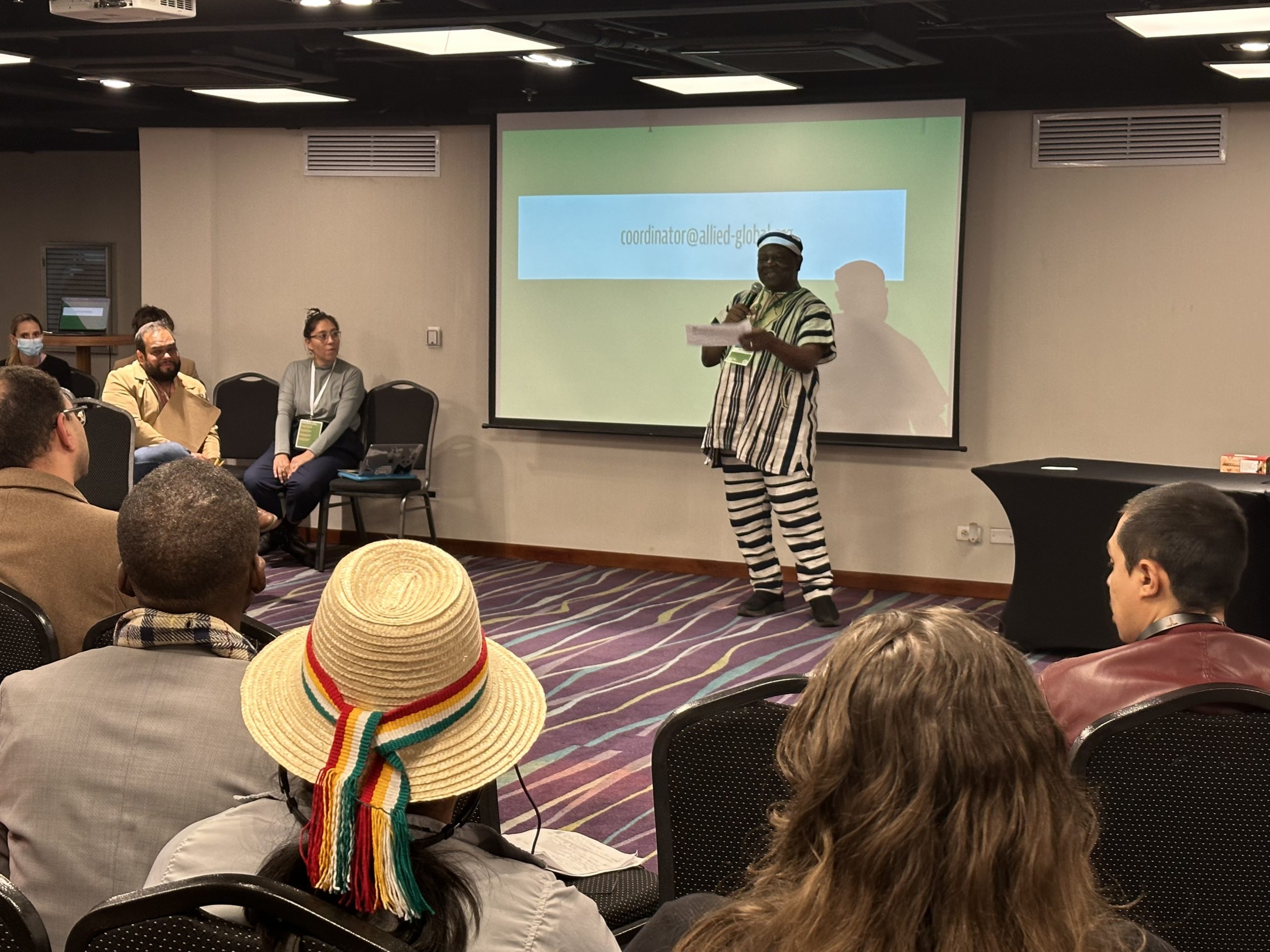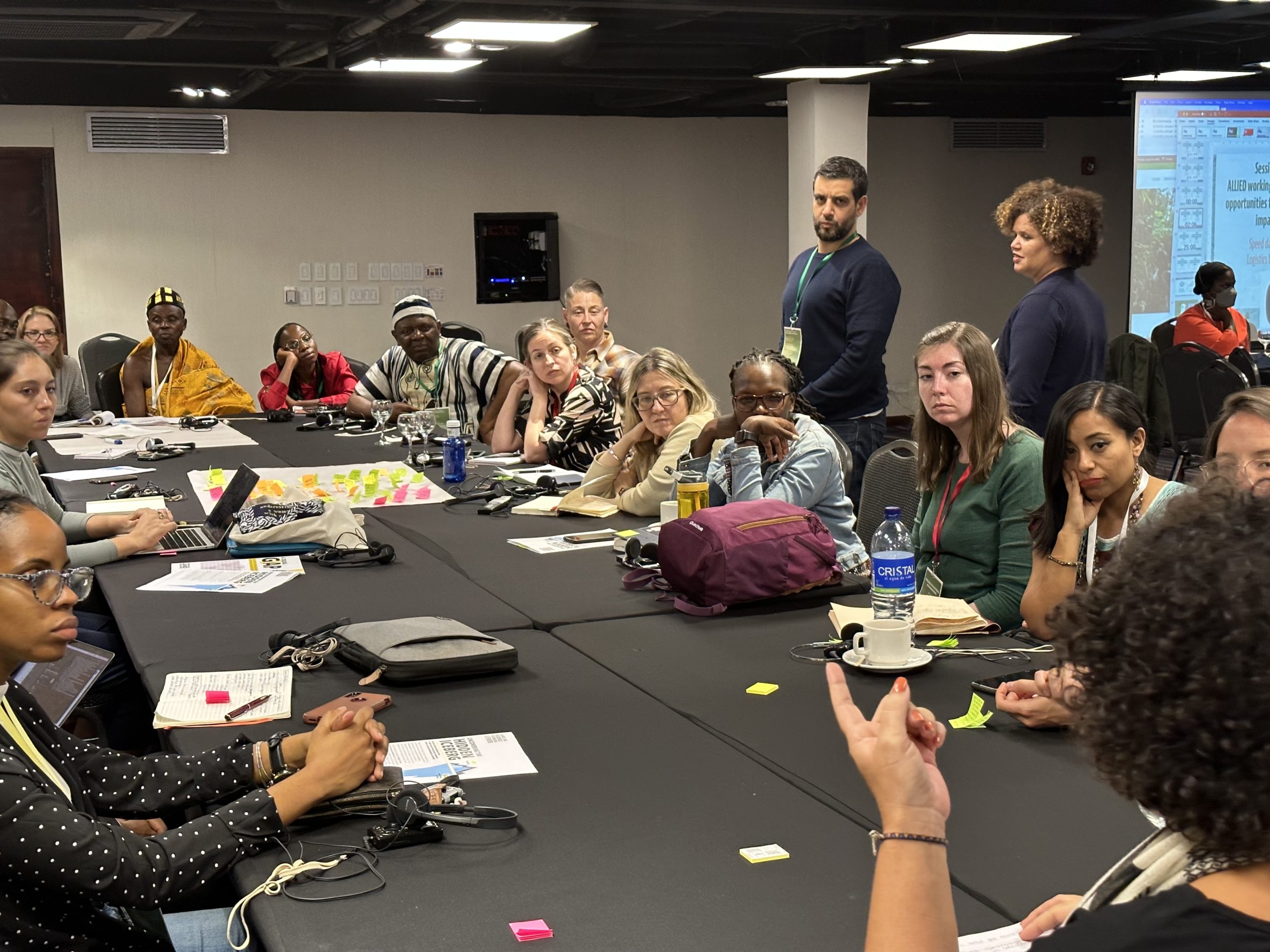BUILDING BRIDGES FOR AT-RISK INDIGENOUS, LAND AND ENVIRONMENTAL DEFENDERS
April 11th to 13th, 2023. Bogota, Colombia.

ALLIED, a global coalition of more than 90 civil society organizations and donors dedicated to safeguarding indigenous, land, and environmental defenders at risk, convened a three-day event in Bogotá, Colombia from April 11th to 13th. The meeting was aimed at gathering ALLIED members and donors, along with environmental, land and indigenous defenders, and regional and international organizations to explore ways and tactics to strengthen the protection of these defenders by fostering collaboration, augmenting advocacy efforts, enhancing coordination, and establishing channels to disburse funds and provide support for defenders facing threats across the globe.
The meeting had three parts, with the first one dedicated to the ALLIED Assembly. Participants listened to the work and achievements of ALLIED since 2018, evaluated their strategy and impact to date, and discussed opportunities for enhanced impact. The second part of the meeting was a deep dive into the existing support strategies for at-risk indigenous, land, and environmental defenders (ILEDs). In the third and final part, the attendees collaborated to come up with suggestions for ALLIED and other key stakeholders on how to strengthen their support and protection of ILEDs.
1. ALLIED ASSEMBLY – WHAT IS ALLIED DOING WELL?
The attendees recognized that the work done so far by ALLIED has contributed to raising awareness of the situation and needs of ILEDs, catalyzing support for these defenders, and increasing knowledge and awareness of strategies to support them.
Participants appreciated ALLIED’s efforts to bring together individuals from diverse backgrounds and regions in Bogotá, Colombia to collectively think, share experiences, and fundraise for shared concerns. ALLIED was also praised for increasing awareness and knowledge on strategies to support defenders and opportunities for improvement.

Latin America:
Sikuani Indigenous People, IJKU – Arhuaco Indigenous People, Siona Indigenous People, San José de Uchupiamonas Indigenous People, Fuerza de Mujeres Wayuu, IM Defensoras, Red de Mujeres Chaparralunas por la Paz, COICA, Tejido Mujer – ACIN, Unión de los Pueblos Awá – UNIPA, The Community Action Board “San Martín de Loba”, ASOPROCAMERLU – Association of Cocoa Producers of Las Mercedes and Luis Vero, Federación Nativa de Comunidades Cacataibos – FENACOCA, Fundación Concern Universal.
AIDA, Ambiente y Sociedad, Artículo 19 México y Centro América, Business and Human Rights Resource Center – Latin America / Colombian National Board, Centro Mexicano de Derecho Ambiental – CEMDA, Centro de Investigación y Educación Popular – CINEP, Corporación Yariguíes – GEAM, PACS / Alternative Policies Institute for the Southern Cone, JUSTIÇA GLOBAL, Observatorio para la Gobernanza Marino Costera – CEAM, Ruta Pacífica de Mujeres, Técnicas Rudas, Tsikini, Zeferino Ladrillero Human Rights Center.
Caribbean:
Caribbean Youth Environment Network (CYEN), Association of Saamaka Traditional Authorities (VERENIGING VAN SARAMACCAANSE GEZAGSDRAGERS) – VSG, Maya Leaders Alliance.
Asia:
Asian NGO Coalition for Agrarian Reform and Rural Development (ANGOC), Asia-Pacific Network of Environmental Defenders (APNED), Defend Tampakan Network, LILAK – Purple Action for Indigenous Women’s Rights, Serikat Perempuan Indonesia (SERUNI).
Africa:
Egyptian Commission for Rights and Freedoms (ECRF), Mano River Union Civil Society Organization Platform, The Zimbabwe Environmental Law Association (ZELA), SIMILIMI Affected People’s Organization, Green Advocates International, Congolese Alert for the Environment and Human Rights – ACEDH.
Center for Justice Governance and Environmental Action, Katiba Institute, Natural Justice, African Defenders (Pan-African Human Rights Defenders Network), Natural Resource Women Platform.
Global:
Access Now, Accountability Counsel, Business & Human Rights Resource Centre, CIVICUS, Civil Rights Defenders (CRD), CLIDEF: Global Climate Legal Defense, The Climate Justice Resilience Fund (CJRF), The ICCA Consortium, The Coalition for Human Rights in Development, Earthrights International (ERI), The Environmental Law Alliance Worldwide (ELAW), The Environmental Defender Law Center (EDLC), Environmental Defenders Collaborative – Global Greengrants Fund, The Environmental Defenders Office (EDO), The European Center for Not-for-Profit Law (ECNL), The Ford Foundation.
The Foundation for International Law for the Environment (FILE), Freedom House, Front Line Defenders, The Global Climate Legal Defense Network (GCLDN), Global Greengrants Fund, Global Witness, Green Leadership Trust, Indigenous Peoples Rights International (IPRI), International Land Coalition (ILC), International Service for Human Rights (ISHR), International Union for Conservation of Nature (IUCN), Lush Cosmetics, Open Briefing, The Open Society Foundations (OSF), OXFAM, Peace Brigades International (PBI), Protection International, The Right Livelihood Award Foundation, Swedish Society for Nature Conservation (SSNC), Transparency International, The Waverley Street Foundation, The World Resources Institute (WRI), Trócaire, True Costs Initiative, Universal Rights Group.

ALLIED’s work on Data Collection and Reporting was also highly appreciated, especially in collecting data beyond lethal attacks. Non-lethal threats are not being documented enough, and tracking them is essential to secure prompt and efficient protection for defenders. The group also highlighted that the commitment of States under SDG 16 to report attacks against defenders is not well known. Advocating for this is the first step to ensure that States adopt strategies to protect defenders and a narrative that portrays them as aligned with sustainable development.
ALLIED’s work on Data Collection and Reporting was also highly appreciated, especially in collecting data beyond lethal attacks. Non-lethal threats are not being documented enough, and tracking them is essential to secure prompt and efficient protection for defenders. The group also highlighted that the commitment of States under SDG 16 to report attacks against defenders is not well known. Advocating for this is the first step to ensure that States adopt strategies to protect defenders and a narrative that portrays them as aligned with sustainable development.
Similarly, the Supports and Solidarity Working Group recognized the group’s advocacy for increased support for ILEDs, including organizing meetings and developing tools and resources to facilitate knowledge and information exchange. The group also applauded the bottom-up approach adopted by ALLIED in its work on support, which has created spaces for defenders to speak directly about their needs.
WHAT COULD ALLIED DO BETTER?
The Allies also identified areas where ALLIED could improve its impact and operations. These opportunities for improvement include increasing grassroots engagement and representation in ALLIED’s leadership, adopting a more consistent strategy for leveraging data to advocate for stronger policies and protections and expanding ALLIED’s presence at the local level to create regional hubs and facilitate direct connection among defenders and support organizations.
To avoid smear campaigns and counteract the criminalization of defenders and their communities, participants advised ALLIED to adopt a narrative change strategy and strengthen donor engagement. They also recommended that ALLIED function as a network/platform for change and be positioned as a central actor in the protection of land, indigenous and environmental defenders. They also emphasized the need for ALLIED to improve communication within the alliance, including through periodic global and regional meetings and other information tools.
Focusing on prevention, ALLIED was encouraged to prioritize community governance, self-protection, and collective protection strategies.
Attendees also suggested that global coordination should be improved by mapping the resources and capacities of its members, identifying existing coalitions or platforms that could be incorporated, and enhancing information sharing and communication with them.
To enhance its impact and operations, suggestions were made for ALLIED to expand its data collection and reporting by increasing country-specific data sets, developing global and regional databases, and providing support and capacity building to ALLIED members and local partners.
In the end, participants suggested expanding The Phonebook and developing a joint advocacy strategy to advance ALLIED’s mission in multilateral spaces and establish a stronger presence in key advocacy spaces and processes.
2. BUILDING TOGETHER – STRATEGIES TO SUPPORT AND PROTECT INDIGENOUS, LAND AND ENVIRONMENTAL DEFENDERS
During the session on protection against ILEDs, participants reconfirmed obstacles identified by ALLIED and members in the reports launched in 2022:
Participants also identified that specific types of support for Indigenous, land, and environmental defenders (ILEDs) are missing or scarce. These included support for livelihood projects, defenders in exile, funding for administrative and community protection costs, strengthened supports for criminalization, strategic litigation and connection to networks, long-term funding, psychosocial support for ILEDs and their families, funding and capacity-building for community-based protection strategies, and tailored support for women and Indigenous Peoples.
HOW TO STRENGTHEN THE IMPACT OF EXISTING PROTECTION STRATEGIES?
Regarding types and forms of protection the attendees recommended: 1. Adopting flexible funding schemes, including in terms of issues and recipients (i.e., non-registered organizations). 2. Adopting strategies to make the protection of ILEDs sustainable in the long run including building protection capacities in ILEDs and their communities and families. 3. Including protection as a budget line in non-protection related projects, when working with local communities.
Concerning the processes and allocation strategies, participants suggested: 1. Increasing coordination between supporters by, inter alia, leveraging existing networks and engaging with grassroots organizations. 2. Allowing defenders to access grants multiple times, as opposed to once or twice. 3. Partner with local networks to share information in locally appropriate forms.
3. OUR WAY FORWARD: A ROADMAP FOR ALLIED AND ALLIES
Finally, participants identified a number of concrete actionable steps that ALLIED and its allies can implement in the short and medium terms. They also suggested that ALLIED could develop new lines of action, specifically:
We, ALLIED appreciate the participation of all attendees, particularly defenders who traveled from remote areas in their countries to share their experiences and knowledge. We also express our gratitude to the civil society organizations and donors that support our efforts and made this gathering possible. We will continue to share our progress and experiences through upcoming resources, and we encourage everyone to stay engaged and informed. Together, we can create a safer and more just world for all defenders.










